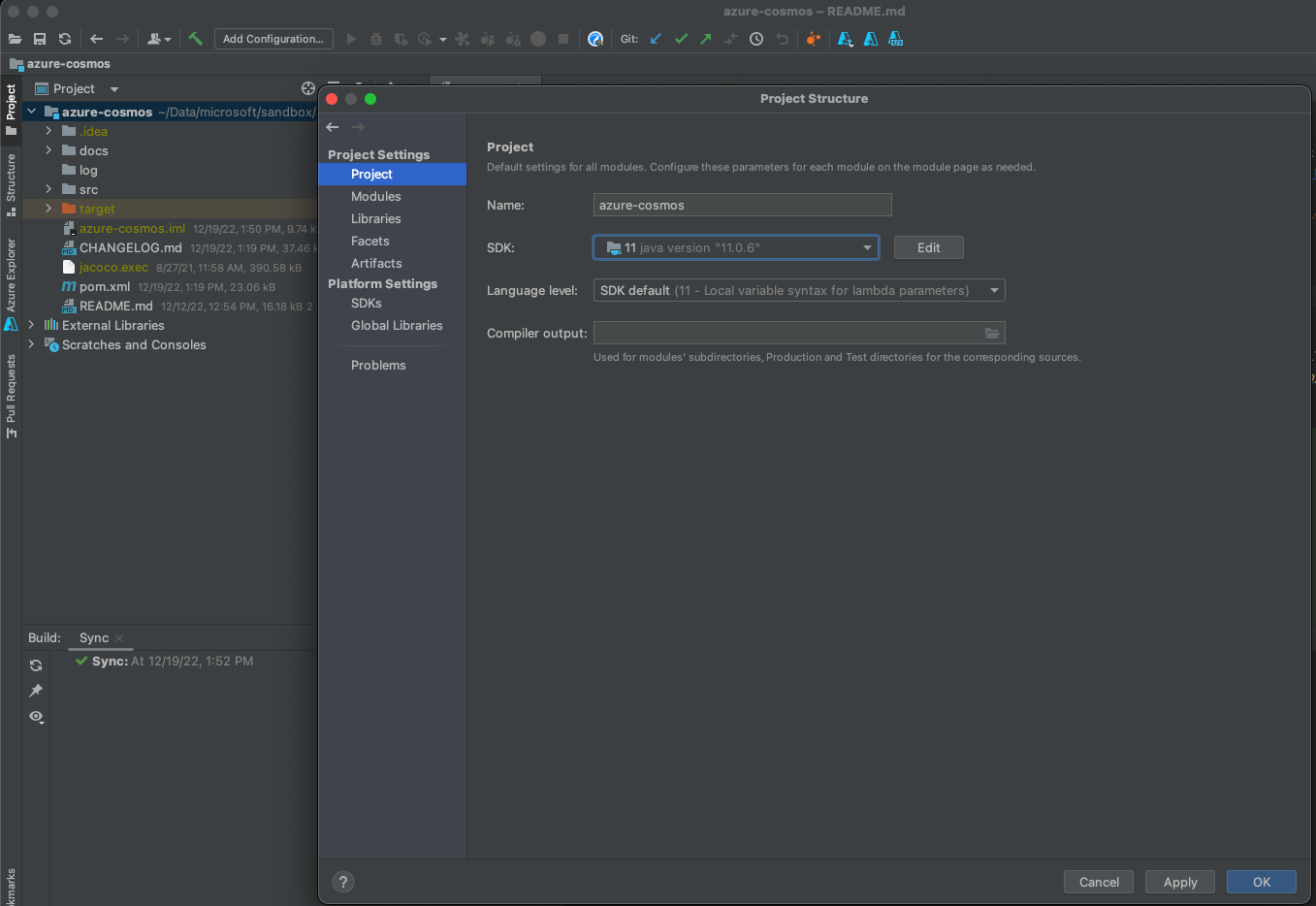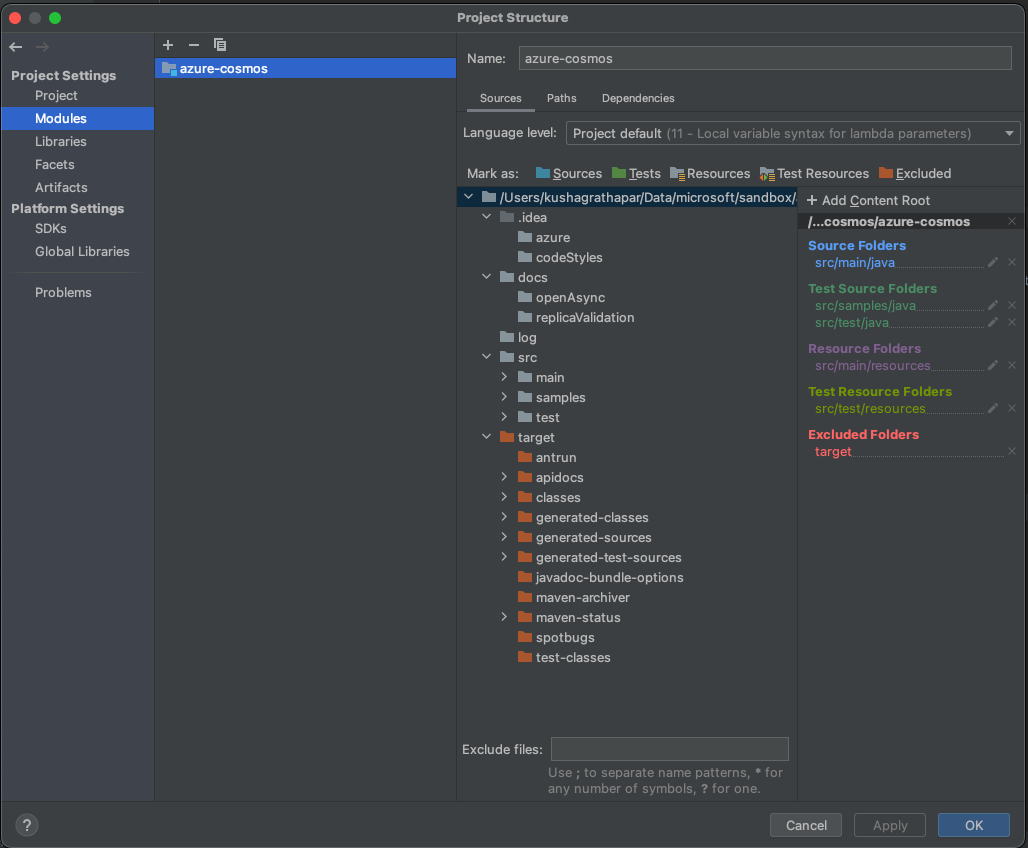This document currently details Maven commands for building Azure Cosmos SDK.
To build and develop locally, it is strongly recommended to fork and clone the repository: https://github.com/Azure/azure-sdk-for-java
NOTE: If running on Windows please ensure that you have enabled LFS-support in Git - see the installation instructions here.
NOTE: All of the below commands need to be run from home directory of azure-sdk-for-java repository.
The build system is configured to support JDK, as well as the current long-term support version of the JDK (currently JDK 11). The commands presented below will work on both JDKs.
Building azure-cosmos SDK locally depends on the availability of the build tooling. This can be installed by running the following:
mvn install -f eng/code-quality-reports/pom.xml To build azure-cosmos library using maven command line, run the following command
mvn -e -Dgpg.skip -DskipTests -Dmaven.javadoc.skip=true -Dcodesnippet.skip=true -Dspotbugs.skip=true -Dcheckstyle.skip=true -Drevapi.skip=true -pl com.azure:azure-cosmos -am clean verifyTips: if you're using powershell on windows, you may run into this error[ERROR] Unknown lifecycle phase ".skip". You must specify a valid lifecycle phase or a goal in the format, this can be fixed by telling powershell to stop parsing this command with stop-parsing parameter "--%"
mvn --% -e -Dgpg.skip -DskipTests -Dmaven.javadoc.skip=true -Dcodesnippet.skip=true -Dspotbugs.skip=true -Dcheckstyle.skip=true -Drevapi.skip=true -pl com.azure:azure-cosmos -am clean verifyTo run unit tests, simply remove -DskipTests option from above commands.
SpotBugs, CheckStyle, and JavaDoc plugins are configured to break the build if there are any issues discovered by them. It is therefore strongly recommended to run the following maven options locally before submitting a pull request:
-Dmaven.javadoc.skip=true -Dcheckstyle.skip=true -Dspotbugs.skip=trueThe build is configured with Revapi plugin to check builds against the latest GA release in Maven. Build will fail when a breaking change is detected. To check for breaking changes, run the following maven options locally before submitting a pull request:
-Drevapi.skip=trueThe default mvn build/install command executes the code quality tools that run analysis for check-style violations, bugs and breaking changes. The build takes more time to complete with these analyses enabled. For intermediate build/install during local development, they can be skipped by adding the following mvn options:
-Dmaven.javadoc.skip=true -Dcheckstyle.skip=true -Dspotbugs.skip=true -Drevapi.skip=true -Dcodesnippet.skip=true
Note: It is strongly recommended to run the analysis locally before submitting a pull request.
Open azure-sdk-for-java/sdk/cosmos/azure-cosmos/pom.xml in IntelliJ IDE as project to import it as a maven project:

Open project structure through project settings for azure-cosmos project and set the SDK and Language Level to JDK 11 under Project tab:

Open Modules tab in the same settings and set the Language level to match project default, which should be JDK 11:

Set target bytecode version for the project azure-cosmos in IntelliJ Preferences for Java Compiler as JDK 11:

Setup Azure Cosmos DB Emulator by following this instruction. Then please export the emulator's SSL certificates and install them in the JVM trust stores on your development machine following this instruction.
For running the SDK unit tests use follogwing start options for the emulator: PS C:\Program Files\Azure Cosmos DB Emulator> .\CosmosDB.Emulator.exe /enablepreview /EnableSqlComputeEndpoint /disableratelimiting /partitioncount=50 /consistency=Strong
For installing the keys on windows following power shell script (running as administrator) can be used:
Push-Location -Path $env:JAVA_HOME
gci -recurse cert:\LocalMachine\My | ? FriendlyName -eq DocumentDbEmulatorCertificate | Export-Certificate -Type cer -FilePath cosmos_emulator.cer
keytool -cacerts -delete -alias cosmos_emulator -storepass changeit
keytool -cacerts -importcert -alias cosmos_emulator -storepass changeit -file cosmos_emulator.cer
del cosmos_emulator.cer
Pop-Location
Unit tests are tests with group "unit" and can be run from IntelliJ directly without needing any Azure Cosmos DB Account or Emulator support. To run them, right click on any unit test class and run them. To test this, run ClientConfigDiagnosticsTest from IntelliJ IDE directly.
Note: When running the Azure Cosmos DB Emulator in a virtual machine you may receive timeouts. If that happens increase the number of cores and improve the I/O performance of the VM.
Azure Cosmos Java SDK has different Integration tests which can be run with Azure Cosmos Emulator or Azure Cosmos DB production Account.
Emulator Integration tests are with test group emulator, labeled in the code as groups = { "emulator" } and can be run from IntelliJ after starting Azure Cosmos DB Emulator on the local development machine. For example, DocumentCrudTest is of group emulator.
Latest version of Azure Cosmos DB Emulator can be downloaded and installed from here Our CI pipelines start Azure Cosmos DB Emulator with these parameters. It is highly recommended to use these for local development and testing.
/enablepreview /EnableSqlComputeEndpoint /disableratelimiting /partitioncount=50 /consistency=StrongOther test groups are meant to be tested against Azure Cosmos DB production account, but can also be tested against Emulator. There are multiple different test groups like groups = {"fast", "long", "direct", "multi-region", "multi-master"}. For example, CosmosItemTest is a simple group test which can be run against Azure Cosmos DB production account, as well as against emulator.
To run any test against Azure Cosmos DB production account, it is required to update TestConfigurations.java class with account host and key.
NOTE: When creating a PR, make sure to remove any account key and account host information from the PR. To avoid security breaches, never commit and push any keys and host information related to Azure Cosmos DB Account.